History of Ship & Offshore Structure Business Division
1878 [Meiji 11]
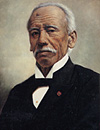
Shozo Kawasaki borrowed a national owned land in Minamiiida-cho, Tsukiji, Tokyo and established Kawasaki Tsukiji Dockyard (The foundation of Kawasaki Heavy Industries, Ltd.).
1896 [Meiji 29]
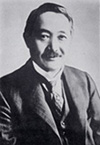
Established Kawasaki Dockyard Ltd. (Capital of two million yen, the first president: Kojiro Matsukata, the advisor: Shozo Kawasaki)
1897 [Meiji 30]
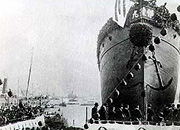
Completed "Iyomaru", the first cargo-passenger ship after becoming a publicity traded company.
1902 [Meiji 35]
Completed the 1st dry dock.
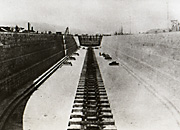
In 1998, for the first time as a dry dock, our dock was registered as cultural properties by the Cultural Properties Protection Law in Japan.
1906 [Meiji 39]
Completed the first domestic submarine.
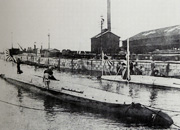
By the introduction of technology from America, two submarines were completed.
1908 [Meiji 41]
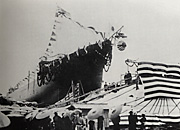
Completed "Yodo", the first large-size warship at a private dockyard.
1915 [Taishou 4]
Completed the first domestic battlecruiser, "Haruna".
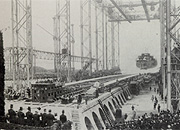
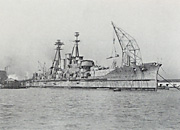
1918 [Taishou 7]
A stock boat, "Raifukumaru" established the world record of short time construction.
Stock boat; identical types of ships were produced in anticipation with a background of the worldwide tonnage lack under World War I.
"Raifukumaru" that was completed in 1918 was built within 30 days from the start of work and broke the world record of short time construction.



1950 [Showa 25]

Completed the large-size tanker, "FERNMANOR," the first Japan-built ship for export.
1955 [Showa 30]
Completed "CHRYSANTHY L", the largest tanker in Japan (at that time).
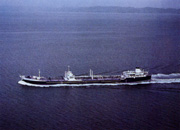
It is equipped with the turbine, which is the biggest one after the war, to the main engine and first adopted a propeller with five blades.
1960 [Showa 35]
Completed "OYASHIO", the first domestic submarine after the war.
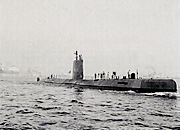
Adopted all welding structure instead of the rivet structure which was common before the war.
1967 [Showa 42]
Established the Sakaide shipyard.
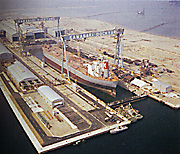
Constructed new large-scale shipyard with an effective layout to meet the trend of building larger size ships.
1969 [Showa 44]
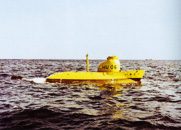
Its submerging depth is 600 m, and it aims at the oceanographic research and observation.
Completed "Shikai", the first Japan-built Deep-sea Research Vehicle.
1970 [Showa 45]
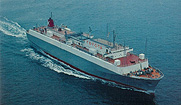
It is equipped with the car deck with 9 layers, and loads more than 2,000 motorcars.
Completed "The 10th TOYOTAMARU", the first Japan-built pure car carrier.
1971 [Showa 46]
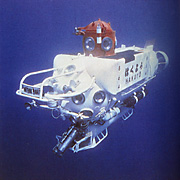
It moves freely on the continental shelf at the depth of less than 300 meters.
Completed the first Japan-built small submersible work vehicle, "HAKUYO".
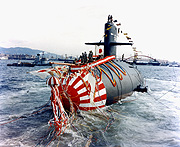
Completed "UZUSIO", the first Japan-built RUITEKI type submarine.
1972 [Showa 47]
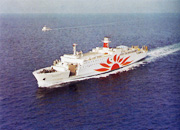
Completed "SANFURAWAA," the biggest and the fastest car ferry in Japan (at that time).
1981 [Showa 56]
Completed the first Japan-built LNG (liquefied natural gas) carrier in Japan, "GOLAR SPIRIT".
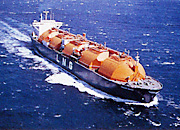
The LNG carrier carries natural gas which is kept at a temperature of -163℃.Natural gas is widely considered to be among the cleanest burning fuels. "GOLAR SPIRIT" adopts the uniquely developed insulation system for tanks, "the Kawasaki panel system".
1985 [Showa 60]
Completed "Chiyoda," the first Japan-built Deep Submergence Rescue Vehicle.
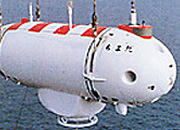
It plays a role to rescue crew safely from the submarine which cannot surface in unexpected accidents.
1989 [Heisei 1]
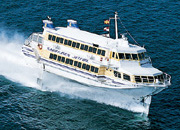
Completed the first Japan-built Jetfoil "TSUBASA".
1994 [Heisei 6]
Completed "HAYATE," an experimental ship of Techno Super Liner.
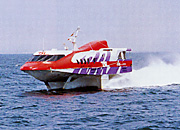
The Techno Super Liner, built as a national project, has passed its required marine test examination.
1995 [Heisei 7]
Established a joint venture company in China, Nantong COSCO KHI Ship Engineering Co., Ltd. (NACKS)

Merged with China Ocean Shipping Company China (COSCO) in China.
2002 [Heisei 14]
Established Kawasaki Shipbuilding Corporation. Became independent of Kawasaki Heavy Industries, Ltd.
2008 [Heisei 20]
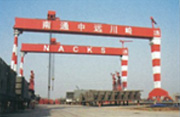
Completes construction of Nantong Cosco KHI Ship Engineering Co., Ltd. (NACKS) No. 2 Dock.
2010 [Heisei 22]
Merges with Kawasaki Heavy Industries, Ltd.
Starts afresh of Ship & Offshore Structure Company.
Kawasaki History

- SEE MORE





